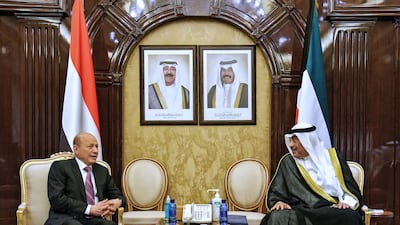Kuwait is planning to appoint an ambassador to Yemen, The National was told on Thursday.
Ali Mansour Bin Safaa, the Yemeni ambassador to Kuwait, said Yemen's President Rashad Al Alimi was told of the intention during a three-day visit to Kuwait, which ended on Wednesday.
“President Al Alimi is grateful to the Kuwaiti leadership for this decision, which was conveyed to him during his meetings with Crown Prince Sheikh Mishal Al Sabah, Prime Minister Sheikh Sabah Al Khalid Al Sabah and Foreign Minister Sheikh Ahmad Nasser Al Mohammad Al Sabah,” said Mr Safaa, who attended the meetings.
Senior Kuwaiti officials also discussed with Mr Al Alimi plans to appoint a co-ordinator of Kuwaiti investments and projects in Yemen, Mr Safaa said.
In April, Mr Al Alimi was sworn in along with other members of an eight-member presidential council in the southern port city of Aden in the presence of United Nations Special Envoy for Yemen Hans Grundberg, as well as several European and Arab ambassadors. Aden is serving as a temporary capital city of Yemen.
Mr Al Alimi replaced former president Abd-Rabbu Mansour Hadi, who stepped aside and ceded his powers to the presidential council.
Full support to Saudi-led coalition
Kuwaiti officials also affirmed their country’s full support for all efforts made by the Saudi-led coalition to bring stability to Yemen and strengthen the current truce, the ambassador said.
“The economic stability and alleviating humanitarian suffering were high on the Yemeni delegation’s agenda during the visit,” he said.
The coalition and the Iran-aligned Houthis agreed last week to extend a truce they reached in April for more two months.
Yemen’s civil war erupted in 2014, when the Houthis seized the capital of Sanaa and much of northern Yemen and forced the internationally recognised government into exile.
The Saudi-led coalition entered the war in early 2015 to try to restore the government to power.
The UN says the conflict has created one of the world’s worst humanitarian crises.
Last month, the World Food Programme’s representative Richard Ragan told The National — on the sidelines of a Gulf tour to meet key donors — that a funding shortfall left the UN with immense budgetary pressures that forced the WFP to make hard decisions about how to distribute food aid fairly.










